 W
WPrince Konstantine (Kote) Abkhazi, was a notable Georgian military officer, politician and public figure. During the Imperial Russian rule, he was a General-major of Artillery in the tsar's army (1916) and in the national army of the Democratic Republic of Georgia (1918), and a recognized leader of the liberal nobility of Georgia. After the Soviet Occupation of Georgia, he emerged as one of the leaders of an underground anti-Soviet, national-liberation movement. One of the founders of the Tbilisi State University in 1918 and Chairman of the Georgian National-Democratic Party in 1921-1923. In 1923, he was arrested and executed by the Soviet security police.
 W
WGalaktion Yeliseyevich Alpaidze was a Soviet Lieutenant General, Hero of the Soviet Union, chief of the Plesetsk rocket proving ground in 1963–1975, and 1977 laureate of the USSR State Prize.
 W
WIvane Amilakhori was a Georgian nobleman and a military commander in Imperial Russian service.
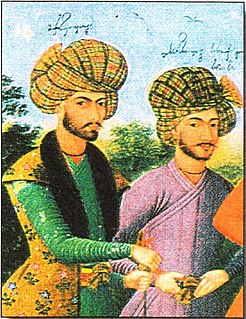 W
WGivi Amilakhvari (1689–1754) was a Georgian nobleman (tavadi) with a prominent role in the politics of eastern Georgia in the first half of the 18th century. He waged a lengthy struggle against the Ottoman and Iranian encroachments, changing sides and forging various alliances as he tried to preserve autonomy for his native kingdom of Kartli as well as to prevent the ascendant Bagrationi dynasty of the neighboring Georgian kingdom of Kakheti from seizing the throne of Kartli. In the closing years of his turbulent life, Amilakhvari stood by his erstwhile Kakhetian foes and sponsored several construction projects across the country.
 W
WAlexander Andronikashvili also known as Andronikov was a Georgian military commander and anti-Soviet resistance leader.
 W
WPrince Ivane Andronikashvili, also known as Knyaz Ivan Malkhazovich Andronnikov was a Georgian nobleman and general in the Imperial Russian service.
 W
WBagrat was a Georgian royal prince (batonishvili) of the House of Bagrationi and an author. A son of King George XII of Georgia, Bagrat occupied important administrative posts in the last years of the Georgian monarchy, after whose abolition by the Russian Empire in 1801 he entered the imperial civil service. He was known in Russia as the tsarevich Bagrat Georgievich Gruzinsky. He is the author of works in the history of Georgia, veterinary medicine and economics.
 W
WIvane Bagration of Mukhrani was a Georgian nobleman of the House of Mukhrani, and general in the Imperial Russian service. He was one of the biggest Georgian landowners of that time and a modernizer of winemaking industry.
 W
WPyotr Bagration was a Russian general and prince of Georgian origin, prominent during the Napoleonic Wars.
 W
WBadri Bitsadze is the former Chief of the Border Police of Georgia. He holds the rank of Lieutenant General, and previously held the posts of Chief Military Prosecutor, Deputy General Prosecutor, and Deputy Minister of Internal Affairs. He is married to the former Chairwoman of the Parliament of Georgia and twofold former interim President of Georgia, Nino Burjanadze.
 W
WVladimer Chachibaia is a Georgian lieutenant general (2019) and former Chief of Georgian Defense Forces from 20 December 2018 to 1 July 2020, the first to be appointed in this position. His previous top commanding positions included being the Chief of Joint Staff and Chief of General Staff of the Georgian Armed Forces.
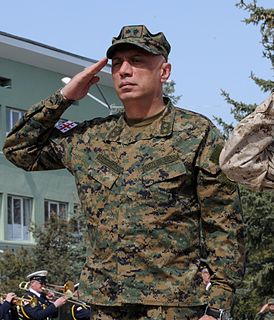 W
WDevi Chankotadze is a retired Georgian Lieutenant-General, who served as the Chief of Joint Staff of the Georgian Armed Forces from March 5, 2009, to October 8, 2012.
 W
WIvan Antonovich Dumbadze was a Major-General of H. I. M. Retinue of Nicholas II, Supreme Head of Yalta, one of the activists of the Union of Russian People, notorious for his antisemitic and extravagant escapades.
 W
WVasily Gabashvili, also known by his Russified name Vasily Davidovich Gabayev (1853–1933) was a Georgian military commander in the service of the Russian Empire and the Democratic Republic of Georgia.
 W
WSemyon Georgievich Gangeblov was a Russian military commander of the Napoleonic Wars. He came of the Georgian noble family Gangeblidze, which emigrated to Russia in 1724.
 W
WArchil Viktorovich Gelovani was a Soviet officer and later Marshal of the engineer troops, responsible for logistics, fortification and military infrastructure during and after World War II. He was tasked on several occasions with fortifying strategically important areas and also reconstruction, including all Black Sea ports during and after World War II. He served primarily on military engineering and defense strategy posts, including being the Deputy Minister of Defence and would play a major role in the structural development of the Soviet armed forces and strategic missile forces during the Cold War era. An avenue in Georgia's capital Tbilisi and a street in the city of Sevastopol have been named after Marshal Gelovani.
 W
WZaza Gogava is a Georgian Major General. He served as a Chief of Joint Staff of the Armed Forces of Georgia from November 2006 to November 2008 and the chief of Border Police from November 2008 to July 2012.
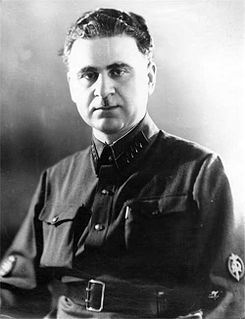 W
WSergo Arseni Goglidze was a Soviet security officer,NKVD official and Colonel General of State Security.
 W
WMikhail Maksimovich Gvishiani was an ethnic Georgian who served as executive officer in the Soviet NKVD. He oversaw the deportation and relocation of ethnic groups from the North Caucasus, which was planned and organized by Lavrentiy Beria and approved by Stalin. Mikhail Gvishiani is particularly known for his involvement in the burning of some 700 civilians in what would later become known as the Khaibakh massacre.
 W
WAlexander Konstantinovich Bagration-Imeretinsky was a Georgian royal prince (batonishvili) and a General of the Russian Imperial Army. A hero of the Russo-Turkish War of 1877, he served as Governor-General of Warsaw in Poland, where he was known for his liberal policies that ultimately led to his replacement by the Russian authorities.
 W
WAleksi Inauri was a Soviet Colonel General and Georgian commander who headed the Georgian KGB for over 30 years (1954–1986) and made it one of the most effective of the KGB's regional Soviet branches. He ended his career as a colonel general and a Hero of the Soviet Union.
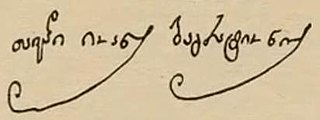 W
WIoane was a Georgian diplomat and military commander. As the head of the Mukhrani branch of the royal Bagrationi dynasty of Kartli, he was Prince (batoni) of Mukhrani and ex officio commander of the Banner of Shida Kartli and Grand Master of the Household (msakhurt-ukhutsesi) at the court of Georgia from 1778 to 1801.
 W
WVladimir Nikolayevich Janjgava was a Georgian Soviet Army Lieutenant General and Hero of the Soviet Union who participated in battles during the Winter War and was a specialist in infantry warfare during World War II. Janigava held command of various infantry regiments, divisions and corps of the Soviet Army. Janjgava served in a series of leadership roles after the war, including as Minister of Internal Affairs of Georgian SSR (1954—1958).
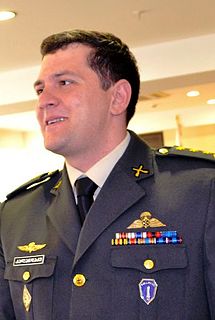 W
WGiorgi Kalandadze is a retired Georgian Brigadier General who was the Chief of Joint Staff of the Georgian Armed Forces from October 8, 2012 to November 11, 2012.
 W
WVakhtang Kapanadze is a Georgian major general who was Chief of General Staff of the Georgian Armed Forces from November 22, 2013 to November 22, 2016. He held the same command from August 2004 to February 2005. Prior he was in charge of the Georgian peacekeeping battalion deployed in South Ossetia before the war broke out.
 W
WYuri Khachaturov is a former Secretary-General of the Collective Security Treaty Organization (CSTO) and former Chief of the General Staff of the Armed Forces of Armenia.
 W
WTengiz Kitovani is a retired Georgian politician and military commander with high-profile involvement in the Georgian Civil War early in the 1990s when he commanded the National Guard of Georgia and served as a Defense Minister until being gradually sidelined by Eduard Shevardnadze who had earlier been invited to lead the nation after a successful coup d'etat launched by Kitovani and his allies against President Zviad Gamsakhurdia.
 W
WGiorgi Kvinitadze was a Georgian military commander who rose from an officer in the Imperial Russian army to commander-in-chief of the Democratic Republic of Georgia. After sovietization of Georgia, Kvinitadze went into exile to France, where he wrote his memoirs of the 1917–1921 events in Georgia.
 W
WSergey Lazarevich Lashkarev, was a Russian Imperial Major-General of Georgian origin. A cunning diplomat and polyglot, he was described by his contemporaries as one of the "remarkable phenomena of Catherine the Great's century". Lashkarev was reportedly fluent in ten languages. Besides Russian and Georgian, he spoke French, Italian, Turkish, Persian, Greek, Armenian, Arabic, and Latin. In 1800, Lashkarev was actively involved in diplomatic exchanges with the Ottoman Empire in connection with the impending Russian annexation of various Georgian kingdoms and principalities, and remained in charge of Georgian affairs at the Imperial court under Alexander I of Russia.
 W
WKonstantin Nikolaevich Leselidze, was a Colonel-General and Hero of the Soviet Union who distinguished himself at the North, Transcaucasus and Ukrainian front during World War II. He was also the elder brother of Viktor Nikolaevich Leselidze
 W
WAbel Makashvili also known as Avel Gavrilovich Makaev was a Georgian prince and soldier who served successively in the Russian, Georgian and Azerbaijani militaries and was killed by the Bolsheviks upon their conquest of Azerbaijan in 1920.
 W
WGiorgi Mazniashvili was a Georgian general and one of the most prominent military figures in the Democratic Republic of Georgia (1918–1921). During the service in the Russian army, he was also known by a Russian transliteration of his surname – Mazniev.
 W
WVarden “Vardiko” Nadibaidze is a retired Soviet and Russian military officer who served as Georgia’s Minister of Defense from 1994 to 1998.
 W
WIlia Odishelidze ; Russian: Илья Зурабович Одишелидзе, Ilya Zurabovich Odishelidze) was a Georgian military leader who had also served as a general of the Imperial Russian army.
 W
WPrince Grigol Orbeliani or Jambakur-Orbeliani was a Georgian Romanticist poet and general in Imperial Russian service. One of the most colorful figures in the 19th-century Georgian culture, Orbeliani is noted for his patriotic poetry, lamenting Georgia's lost past and independent monarchy. At the same time, he spent decades in the Russian military service, rising through ranks to highest positions in the imperial administration in the Caucasus.
 W
WJoni Pirtskhalaishvili is a retired Georgian lieutenant general (1999). He was the country's Minister of Defense from 15 September 1991 to 2 January 1992 and the Chief of General Staff of Georgian Armed Forces from May 1998 to September 2003.
 W
WPrince Nikolay Pavlovich Shatilov was a nobleman and general of the Russian Empire. He was the son of Pavel Nikolaevich Shatilov who also served as a commanding officer. Nikolay Shatilov was responsible for pacifying regional unrest in the Caucasus and initiating several judicial reforms. He also participated in the 1877 Russo-Turkish war and was decorated with several awards. After retiring from service, he went back to Tbilisi where he spent the last years of his life.
 W
WDavid Tevzadze is a retired Georgian lieutenant general who was the country’s Minister of Defense from April 1998 to February 2004.
 W
WVarden Tsulukidze was a Georgian military commander and anti-Soviet resistance leader.
 W
WVakhtang also known as Almaskhan (ალმასხანი) was a Georgian prince royal (batonishvili) of the Bagrationi dynasty, born to King Heraclius II and Queen Darejan Dadiani. He distinguished himself in the war with Iran in 1795 and was then active in opposition to his half-brother George XII of Georgia and the newly established Russian administration in Georgia. In 1802 he surrendered to the Russian authorities and spent the rest of his life in St. Petersburg, working on an overview of Georgia's history. In Russia he was known as the tsarevich Vakhtang Irakliyevich Gruzinsky.
 W
WPrince Lev Mikhailovich Yashvil, also known as Levan Mikheilis dze Iashvili was a Georgian nobleman and a general of the Imperial Russian Army. Yashvil took part in a number of significant military campaigns, including during the French invasion of Russia, the Russo-Turkish War (1787–1792) and the Kościuszko Uprising.